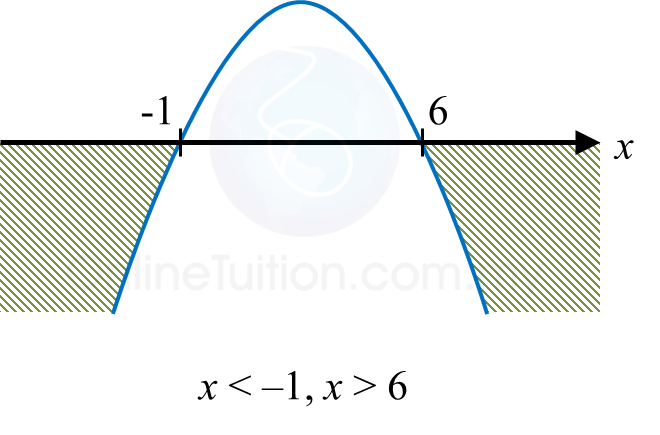Question 11 (4 marks):
The quadratic function f is defined by f(x) = x2 + 4x + h, where h is a constant.
(a) Express f(x) in the form (x + m)2 + n, where m and n are constants.
(b) Given the minimum value of f(x) is 8, find the value of h.
Solution:
(a)
f(x) = x2 + 4x + h
= x2 + 4x + (2)2 – (2)2 + h
= (x + 2)2 – 4 + h
(b)
Given the minimum value of f(x) = 8
– 4 + h = 8
h = 12
The quadratic function f is defined by f(x) = x2 + 4x + h, where h is a constant.
(a) Express f(x) in the form (x + m)2 + n, where m and n are constants.
(b) Given the minimum value of f(x) is 8, find the value of h.
Solution:
(a)
f(x) = x2 + 4x + h
= x2 + 4x + (2)2 – (2)2 + h
= (x + 2)2 – 4 + h
(b)
Given the minimum value of f(x) = 8
– 4 + h = 8
h = 12
Question 12 (3 marks):
Find the range of values of x such that the quadratic function f(x) = 6 + 5x – x2 is negative.
Solution:
(a)
f(x) < 0
6 + 5x – x2 < 0
(6 – x)(x + 1) < 0
x < –1, x > 6

Find the range of values of x such that the quadratic function f(x) = 6 + 5x – x2 is negative.
Solution:
(a)
f(x) < 0
6 + 5x – x2 < 0
(6 – x)(x + 1) < 0
x < –1, x > 6

Question 13 (4 marks):
(a) It is given that one of the roots of the quadratic equation x2 + (p +3)x – p2 = 0, where p is a constant, is negative of the other.
Find the value of the product of roots.
(b) It is given that the quadratic equation mx2 – 5nx + 4m = 0, where m and n are constants, has two equal roots.
Find m : n.
Solution:
(a)
(b)
(a) It is given that one of the roots of the quadratic equation x2 + (p +3)x – p2 = 0, where p is a constant, is negative of the other.
Find the value of the product of roots.
(b) It is given that the quadratic equation mx2 – 5nx + 4m = 0, where m and n are constants, has two equal roots.
Find m : n.
Solution:
(a)
(b)